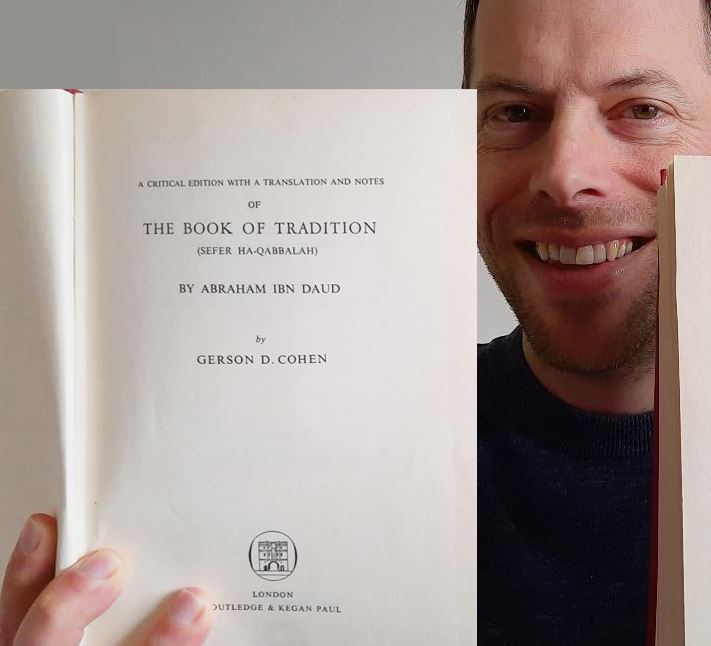Rabbi Abraham Ibn-Daud – Sefer Hakabbalah. Sefer ha-Qabbalah. ספר הקבלה לרב אברהם בן דוד (ראב”ד)
Rabbi Abraham Ibn-Daud (ben David) Halevi, known as Rabad (born circa 1110; died 1180). A prominent scholar and translator, arguably he “…introduced Arabic numerals and the concept of the “zero” into European Mathematics.” [1] Some scholars believe he is the same person as the translator Avendauth, also known as “Avendeuth philosophus israelita”. [2] He was “…the first Jewish philosopher to draw on Aristotle’s writings in a systematic fashion.” [3]
The book “…has been and remains a prime source of information for much of Jewish history from the days of Alexander the Great until the Almohade invasion of Spain in the middle of the twelfth century.” The book is a “…chronicle portrayed Jewish leadership of all ages as a chain composed of uniform links. Only the time, names and places of the links varied. Their tradition and way of life had never changed. Their loyalty to the legacies they had received were conclusive testimony to their honesty and authenticity and to the legitimacy of their claim to govern.” [4]
In the prologue (of Cohen, D. Gerson, 1967 edition), Ibn Daud, writes:
The purpose of this Book of Tradition is to provide students with the evidence that all the teachings of our rabbis of blessed memory, namely, the sages of the Mishna and the Talmud, have been transmitted: each great sage and righteous man having received them from a great sage and righteous man, each head of an academy and his school having received them from the head of an academy and his school, as far back as the men of the Great Assembly, who received them from the prophets, of blessed memory all. Never did the sages of the Talmud, and certainly not the sages of the Mishna, teach anything, however trivial, of their own invention, except for the enactments which were made by universal agreement in order to make a hedge about the Torah.
Now should anyone infected with heresy attempt to mislead you, saying: “It is because the rabbis differed on a number of issues that I doubt their words,” you should retort bluntly and inform him that he is “a rebel against the decision of the court”; and that our rabbis of blessed memory never differed with respect to a commandment in principle, but only with respect to its details; for they had heard the principle from their teachers, but had not inquired as to its details, since they had not waited upon their masters sufficiently. As a case in point, they did not differ as to whether or not it is obligatory to light the Sabbath lamp; what they did dispute was “with what it may be lighted and with what it may not be lighted.” [5]
ספר הקבלה לר’ אברהם אבן דאוד הלוי נדפס לראשונה במנטובה בשנת רע”ד יחד עם שני חיבוריו ההסטוריוגרפיים האחרים והם “זכרון דברי רומי” ו”דברי מלכי ישראל בבית שני”, בצירוף ל”סדד עולם רבא” ו”סדר עולם זוטא” ו”מגלת תענית”. [6]
Book First published in 1160.
On this website 18 Feb 2021. Updated 6 March 2021.
The PDF of the book on this website was scanned by the University of Toronto, from the book Mediaeval Jewish chronicles and chronological notes, edited by Neubauer, Adolf, 1887. Publisher: Oxford, Clarendon Press. Gil Dekel carried OCR of the PDF and uploaded it on 18 Feb 2021. It is believed that the book is in public domain.
- Dimont, Max I. (1962). Jews, God, and History. New York: Simon and Schuster, p. 198:
“One of the earliest and most prominent of… Jewish intellectuals imported by the rulers of Western Europe, was Ibn Daud, who not only translated Hebrew, Greek, and Arabic literature into Latin, but also introduced Arabic numerals and the concept of the “zero” into European Mathematics.” - Freudenthal, Gad. (2016) “Abraham Ibn Daud, Avendauth, Dominicus Gundissalinus and Practical Mathematics in Mid-Twelfth Century Toledo.” Aleph , Vol. 16, No. 1, pp. 61-106. Published by: Indiana University Press. https://www.jstor.org/stable/10.2979/aleph.16.1.61
- Britannica Encyclopaedia. “Abraham ben David Halevi ibn Daud”. Encyclopedia Britannica, https://www.britannica.com/biography/Abraham-ben-David-Halevi-ibn-Daud. Accessed 6 March 2021.
- Cohen, D. Gerson. (1967) A critical edition with a translation and notes of the Book of Tradition (Sefer ha-Qabbalah) by Abraham ibn Daud. London: Routledge & Kegan Paul. [see pages XIII, LXII]
- Ibid, pages 3-4
- Ibid, see Hebrew section of the book, page ט

Cohen, D. Gerson, 1967 edition of Rabbi Abraham Ibn-Daud – Sefer Hakabbalah (Photo: Gil Dekel, 2021).
